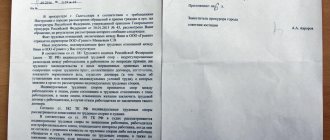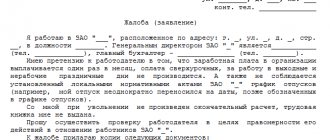Employers do not always behave conscientiously towards their employees. Sometimes they cross the line of legality, neglecting the labor rights of their subordinates. One of the ways to effectively protect yourself is to file a complaint with the prosecutor’s office about the employer’s illegal actions. She is authorized to receive appeals if labor standards have been violated and to verify all facts.
The issue of drawing up a complaint seems easy, but in practice there are many peculiarities. The article describes when the prosecutor's office can accept a complaint, how and within what time frame it considers it. Each method of filing a complaint is considered separately. All the nuances are in the article.
- An exception. When will an anonymous complaint be accepted?
- Complain by calling the hotline
- How are out-of-scope issues handled?
In what cases is a complaint filed against an employer with the prosecutor's office?
The main normative act regulating the activities of the prosecutor's office is Law No. 2202-1 of January 17, 1992. The primary task that the prosecutor's office sets for itself is monitoring compliance with the law.
The department's supervisory activities also extend to labor legislation. In this case, employers (individual entrepreneurs and organizations) are subject to verification.
The law does not outline the regulatory boundaries of competence in this area. In some situations, complaints may require extensive review and investigation.
That is why some applications may be redirected to the target inspection authorities - the Labor Inspectorate. In other cases, everything is limited to a presentation with a requirement to correct violations. The powers also allow you to prepare documents for consideration in court.
Any employee or individual team has the right to file a complaint against their employer. The grounds for appeals may be different:
- the employee was forced to resign;
- wages have not been paid or are delayed;
- pay unofficial wages (gray or black);
- are unlawfully denied employment;
- safety rules at work were violated;
- overtime work is not paid;
- management exerts psychological pressure on the employee when resolving a number of issues.
Initiating an inspection requires not only filing a complaint, but also collecting documentation confirming the violation.
Where should I complain about violations committed by my employer?
There are several authorities in Russia that are authorized to resolve such conflict situations. But before asking for their help, it might be more rational to try to resolve the situation without bringing the conflict to the masses. More precisely, talk to your superiors.
If this doesn't work, it's time to take drastic measures. For example, you can write a complaint and send it to the following authorities:
- Labour Inspectorate;
- prosecutor's office;
- court.
Each of the authorities under consideration has its own operating features, which should be discussed in more detail before deciding where exactly to write.
How to write a statement to the prosecutor's office against an employer?
Despite the lack of an approved document template, there are still some requirements for it. The complaint must reflect all the information necessary for its consideration.
Text of the complaint
Conventionally, the text part is divided into three parts:
- Introductory.
- Descriptive.
- Resolute.
The first part states:
- To whom the document is addressed – the prosecutor in charge of the relevant prosecutorial body. His last name, initials, and rank are indicated.
- About the territorial department of the prosecutor's office (full name of the body and address).
- About the applicant (full name, place of residence, telephone number).
The second part contains information directly related to the application:
- About the employer (his name, address).
- The applicant's position and duration of employment.
- Known facts and actions that indicate a violation of labor laws are set out with a clear chronology.
- Violated labor standards are listed and links to regulations and articles are provided.
- It is reflected whether the applicant contacted the employer to solve the problem or correct the violation.
The third part indicates the complainant’s requirements for an inspection and the expected results:
- Submit a request for immediate elimination of violations.
- Submit the materials to the Labor Inspectorate so that the culprit is given an administrative penalty.
- Consider bringing the culprit to justice.
- File a separate lawsuit in court to protect the complainant’s labor rights.
List of documents
There is no specific general list of documents, so you need to focus on the situation. But even if the complainant is unable to attach some documents or forgets about them, the prosecutor’s office is authorized to independently request them from the employer .
Typically, when filing a complaint, you must attach copies of:
- documents evidencing employment: employment contract and, if any, additional agreements, work book;
- an order according to which the employee was hired and allowed to work, transferred to another place of work, fired, paid a bonus, given leave, etc.;
- pay slips for accrued wages;
- bank statements;
- certificates;
- receipt and expenditure orders;
- other documentation confirming the fact of violation on the part of the employer.
All documents provided are listed in the form of a numbered list at the end of the complaint . The full name of the document being sent is indicated, along with the number of sheets and copies.
When the complaint is fully drawn up, it is signed by the applicant personally. The document contains the date of its submission to the prosecutor's office , and not the day on which it was drawn up.
obrazec-zhaloby-o-narushenii-trudovyh-prav
What supporting documents should I attach?
The more evidentiary documents are attached to the application, the faster the prosecutor will be able to begin work on the appeal.
List of documents required to the prosecutor's office regarding non-payment of wages:
- Employment contract.
- Time sheet or work schedule signed by the manager.
- Order on hiring and/or dismissal.
- A copy of the work book.
- Statement from salary card account.
- A copy of the wage regulations.
Attach all available documents or copies thereof to the application. If you don’t have the documents on hand, indicate in the petition part the need to send a prosecutor’s request to the employer to provide documents.
ConsultantPlus experts discussed how to draw up a statement to the prosecutor's office about libel. Use this form for free.
Is it possible to submit an anonymous letter?
Typically, an employee does not want the employer to somehow find out who exactly initiated the audit in the organization. Therefore, a completely logical question arises: is anonymity possible when filing a complaint?
It is impossible to complain anonymously without disclosing your data to the prosecutor’s office directly , since the applicant’s concealment of information about himself, according to the Law “On Citizens’ Appeals” No. 59, is a reason for refusing to consider the applicant.
8(800)350-23-68
Dmitry Konstantinovich
Expert of the site "Legal Consultant"
Ask a Question
If the complainant does not want his name disclosed to the employer, a note must be made in the last part of the application to maintain the confidentiality of the complaint . In this case, the prosecutor's office will be obliged to keep the applicant's personal data secret. Employees are personally responsible for maintaining confidentiality.
An exception. When will an anonymous complaint be accepted?
However, every rule has its exceptions. Anonymity must be considered under the following circumstances:
- it contains information about a crime (already committed or planned). Such statements are immediately forwarded to the appropriate law enforcement authorities.
- information is provided about criminals from among citizens, officials who are involved in illegal actions (committed or planned);
- the complaint reports an actual or planned act of a terrorist nature;
- the document notifies about corrupt practices, facts of abuse of position by officials, inducement to give a bribe, extortion by government officials, etc.
Even with unconfirmed data, investigations into these facts are required.
Nuances of competence
The law does not provide a precise definition of the competence of this body. It is important for everyone who applies to understand that most of the issues that are addressed to the prosecutor’s office require a serious investigation. Therefore, the prosecutor will accept the complaint, but will forward it to the appropriate control body.
Representatives of the prosecutor's office decide what to do and where to redirect the application in each case individually. A prosecutor can draw up a protest and a presentation against a violation, and go to court, since he himself does not have the right to make decisions on bringing to justice.
In most cases, if the employee did not contact the labor inspectorate before filing a complaint, the prosecutor will first send the case there for consideration. And after the investigation, he can go to court to bring the negligent employer to appropriate penalties.
Attention! In this regard, it is recommended to consult with lawyers or read this information yourself before writing a complaint.
Features of filing collective complaints
Let us warn you right away that a collective complaint against an employer to the prosecutor’s office is not anonymous.
Some violations affect not just one employee, but an entire group. In such cases, the complaint is filed collectively. The structure of such a complaint coincides with an individual one.
However, there are certain features that need to be taken into account:
- Several persons appear in the statement at once, so the text contains the wording “Employees of the organization...”.
- Since there are several applicants, after drawing up the document, each employee whose labor rights were violated must sign it.
- The violation must affect all complainants at once. Otherwise, you will need to draw up the document separately.
- Any employee can be involved in the preparation, but everyone affected by the document must confirm compliance with the specified information.
Once the complaint is made, one person is selected from the group to represent the interests of all employees. He will monitor the situation and communicate with representatives of inspection and regulatory authorities.
Documents sent along with the complaint
After it has become clear how the application can be delivered, it is necessary to talk about what else the package of documents sent along with the complaint to the prosecutor’s office should contain.
The fact is that any information contained in the application to the prosecutor must have factual confirmation. In other words, every statement must be proven.
Therefore, the complaint must be accompanied by documents that can be used as evidence.
For example, if the question concerns the delay of salary, which is paid to a plastic card, you must provide an extract from the current account. It will clearly show that payment for work was not received from the employer.
If the company pays wages in cash, then you need to attach a payroll slip.
This approach must be applied to all information contained in the complaint. Otherwise, the statements will appear unreliable.
To which prosecutor's office should I file a complaint against my employer?
Alternative jurisdiction applies to complaints. This means that you can send an application to the prosecutor’s office:
- located at the place of registration of the complainant;
- operating in the territory where the organization in respect of which the document is being submitted is registered;
- in case of a collective complaint - according to the previous option.
When submitting an application to another authority, the application must be redirected. The review period will be extended accordingly, since the document will be received by the prosecutor’s office authorized to consider the complaint later.
Regulatory consolidation
Regulatory consolidation implies that the employee must make references to regulations, the norms of which were violated by the employer. Those. it is necessary to clearly indicate the offenses in accordance with the current legislation of the country.
First of all, before submitting an application, you need to familiarize yourself with the contents of the Labor Code, because it is this regulatory act that contains all the rules for interaction between the employer and employee.
It is very important that the complaint is filed correctly. Therefore, it is necessary to accurately indicate the point, part, article that was violated by the actions of the employer. Also, after indicating the number, it is necessary to decipher the name of the article by rewriting it from the law.
Attention! If an employee wants to report several violations, then an article must be selected for each fact. There are no restrictions on the number of points and violations described in the complaint.
How to report a violation?
Various methods are used for circulation. We will describe all the methods separately. And you decide for yourself which one to use.
Complain by calling the hotline
You can contact us at various numbers:
- To the general hotline +7(495) 987-56-56;
- To submit appeals in the capital or.
The operator will answer if the call is received during business hours - from 900 to 1800 (Monday to Thursday), from 900 to 1645 on Friday. Lunch break from 1300 to 1345. - Call the helpline (without disclosing your details). Works around the clock. Just a description of the situation that has arisen is sufficient.
Filing a complaint in person
In this case, you should personally come to the department and hand over the documents. To do this, you should contact the office. Prepare a second copy of the complaint in advance so that it can be marked.
The package of documents is accepted by the responsible employee. He puts his signature and registers the appeal in the journal. Additionally, a stamp is placed.
If you refuse to affix a mark, you must indicate that the procedure for considering applications does not contain any prohibitions on affixing marks. Refusal is a reason to file a complaint against such actions.
After receipt, the document is handed over to the responsible prosecutor for execution.
You must have a passport with you for identification.
Through a representative
If it is not possible to file a complaint in person, you must act through a representative. However, for this you will first need to issue a power of attorney in his name from a notary . You need to approach the drafting of a power of attorney very carefully. The powers of the representative must be clearly defined.
It is better if a general power of attorney is issued. These also register, if necessary, to represent interests in judicial structures.
When submitting a complaint to the department with attached documents, the representative will also need to prove his identity. If the power of attorney specifies a passport, then that is what needs to be presented.
In addition to the complaint, the representative must attach a copy of his passport.
By mail
This method is complicated. Firstly, the letter may be delayed. Secondly, there is a possibility that it will get lost. But in most cases, correspondence still reaches the addressee.
If you want to send a complaint by mail, it is better to send a package of documents using a notification . An inventory is also desirable to confirm the fact that documents were included.
In addition to the complaint itself and its attachments, you should add a copy of your passport. Receipt will be confirmed by the return of the notification receipt . If it is not returned, you need to contact the post office with a question.
Online appeal
The right to such treatment is ensured by the following regulations:
- Law 59-FZ of May 2, 2006;
- By order of the Prosecutor General's Office of Russia dated January 30, 2013 N 45.
Through the Internet reception of the prosecutor's office
- Go to the official website of the Prosecutor General's Office.
- Click on the “Online Reception” tab.
- In the field “Prosecutor's Offices in the constituent entities of the Russian Federation”, select your subject to speed up the verification of the appeal.
Further, each reader will have his own scheme for filing a complaint. But there are general requirements:
- Anything marked with an asterisk (*) must be completed.
- Applications without the citizen’s surname and address will not be considered (Article 11 of Law 59-FZ, paragraph 2.8 of the Instructions).
- Applications are accepted only in Russian.
- In order for a complaint to be considered, there must be enough information, and the essence of the issue must be clear, otherwise - refusal (clause 2.9 of the Instructions).
- The application must be accompanied by documents and other materials necessary for consideration. File size is limited to 5 megabytes. Larger materials are sent by mail.
- Applications that contain audio and video recordings, links (hyperlinks) to sites where a certain file format is stored can also be considered.
Complaint to the Prosecutor General's Office
If the appeal falls within the competence of the Prosecutor General's Office, an online complaint is possible directly to this structure. The rules for writing an application and the specifics of attaching files are the same, but there are some differences:
- Among other things, a complaint can be filed against the actions/inactions of regional prosecutors' offices.
- If you need to provide a large volume of documents, you can apply by mail to the address GSP-3, 125993, Moscow, st. Bolshaya Dmitrovka, 15a.
General Prosecutor's Office of the Russian FederationProsecutor's Office in Moscow
To contact the Prosecutor General's Office of the Russian Federation via the Internet:
- Go to the same internet reception page, scroll down without selecting a region.
- Please read the warnings, including penalties for perjury. If you continue filing the complaint, click the “Agree” button.
- Select the type and type of request. The type is selected from those proposed, and in the context of the topic under consideration, “appeal from an individual” or “collective complaint” are suitable. There are only two types: corruption cases and all the others.
- Enter the applicant's full name. Please note that anonymous complaints will not be considered. Here, indicate (select) the country - Russia, and the region. Once completed, click “Continue”.
- Enter information about the message delivery method. This implies receiving a response to the complaint. To respond to an email, simply indicate your email address. Those wishing to receive the message by regular mail must provide the full address. Click Continue.
- The next section is the message itself, but first choose a topic. “On violation of labor rights (except for litigation)” is most suitable, but the topic may be different.
- Next, enter the text itself and add the necessary files. See the structure of the text above in this article. Our advice is to compose the text in advance, check and copy it into this field. All that remains is to check everything again, click the captcha and click on the “Continue” button.
- to confirm your email address will be sent to the specified e-mail Follow it, otherwise the message will not be accepted for consideration.
After confirmation, you will receive a message indicating that the complaint has been accepted for consideration, and subsequently an answer to your question.
Through State Services
Applications are also possible through the State Services portal. The interface will look different, but the final addressee will be the same prosecutor's office. To use this method, you must register on the State Services website and pass authorization. Further:
- Go to the service page and read the information about it.
- Click "Submit a request."
- Check the applicant’s data automatically pulled from your personal account. Please note that email is in the category optional to fill out, but if you want to receive an electronic response, you must enter this information.
- The passport details will also be filled in automatically - check them.
- Choose region. By default, the region of your registration may be entered - it can be changed.
- A field familiar from the previous method is the type of appeal. Choose "general character".
- Next, all fields will be familiar. Here is the topic of appeal.
- Enter text, add files. How to do this has already been described several times above.
- Next are two “checkmarks”. Please put the first one only if you want to receive a written response (you will need to provide a postal address). The second - agreement with the rules, notification of familiarization with liability for giving false testimony - is mandatory.
All that remains is to send a message and wait for the results. If the e-mail is specified in your personal State Services account, you will not have to confirm it again.
Sample
There is no single sample application to the prosecutor's office established in the legislation, therefore it is allowed to be written in free form.
But when preparing the document, you must take into account the following recommendations:
- The complaint is written in an official business style, without stylistic overtones or the use of obscene expressions.
- The document must indicate information about the applicant.
- The application must be written in legible handwriting.
- The complaint must briefly and concisely state the essence of the conflict.
- Additionally, you can provide links to legal and regulatory acts that the employer violates.
The header of the application indicates the details of the prosecutor's office and information about the citizen. In the main part, you must briefly outline the essence of the claim and fill in information about the employer. At the end of the document, a date and signature are placed, and a list of attachments is indicated.
An application to the prosecutor's office against an employer regarding violation of labor rights (sample) is submitted to the prosecutor's office at the location of the organization. In accordance with Art. 11 of Law No. 59-FZ, a response to an appeal is not given if the surname or postal address of the citizen is not indicated. The application indicates a convenient way to receive the verification result (by registered mail, by e-mail).
Download a sample complaint to the prosecutor's office against an employer - black wages
Download a sample application to the prosecutor's office for non-payment of wages upon dismissal
Download a sample complaint to the prosecutor's office against an employer for illegal dismissal
Download a sample complaint to the prosecutor's office against an employer about violation of labor rights
Procedure and terms for consideration of an appeal
As soon as the appeal is sent, regardless of the method, the prosecutor's office has 30 days to check . This period is established by part 2 of article 10 of Law 2202-1. But if the issue can be resolved without additional study of the materials, the period can be halved.
If the prosecutor's office is initially selected by mistake or the application is submitted to the Prosecutor General's Office, the countdown of the period will begin again from the moment the materials are transferred to the authorized body.
If it is necessary to more fully clarify the details of the violation, send inquiries, or request additional documents, the period may be extended by 15-30 days
Verification activities are reduced to the following stages:
- Study by the prosecutor of the legislative framework and practice in similar cases. Determining the circle of people who will need to be involved in the procedure.
- Travel to the site of the violation and initiate an inspection of the employer in order to confirm the violation.
- After requesting the necessary documents and studying them, guilt and responsibility are determined.
- A notice is issued requiring the employer to correct the violation committed by him within a specified period.
Results
To summarize, we note that the current legislation quite clearly answers the question of who to complain about the employer, defining the list of authorities and the procedure for contacting them with complaints about the administration of the organization.
The article offered to readers will allow them to quickly determine where and in what way it is best to address a specific issue. You can find more complete information on the topic in ConsultantPlus. Free trial access to the system for 2 days.
Check of the employer by the prosecutor's office
Based on the complaint filed, the prosecutor has the right to conduct an inspection of the organization.
In addition to explanations, the prosecutor has the right to request documents from the employer, interview employees and take their written explanations. At the same time, the manager has up to 15 days to do this as soon as the corresponding request is received. The inspection can be carried out throughout the territory where the organization is located.
If violations are discovered during the inspection, the prosecutor has the right to:
- Make an official protest addressed to the manager if an internal document issued by him violates the law (for example, if work is paid only once a month). 10 days are allotted for consideration of the protest. The response must be prepared in writing and on time. The manager will have to make appropriate changes to the act. The refusal must be motivated.
- Submit a provision, demanding that the identified violations be corrected (Article 24 of Law 2202-1 “On the Prosecutor’s Office of the Russian Federation”). It usually takes a month to resolve. Elimination of violations is reported in writing with a detailed explanation of the measures taken.
- A resolution is issued that initiates proceedings upon detection of an administrative violation under Article 5.27 of the Code of Administrative Offences. If we are talking about violations of labor legislation, the cases will be considered either by the Labor Inspectorate or in court.
Deliberate failure to comply with the prosecutor's requirements will result in a fine under Article 17.7 of the Administrative Code:
- organizations face a fine of up to 100 thousand rubles;
- if an official is guilty - up to 3 thousand rubles.
The inspection is not always carried out by representatives of the prosecutor's office; sometimes it is entrusted to the Labor Inspectorate. For this purpose, a corresponding requirement is made.
How to complain to the labor inspectorate
The first place that comes to mind as soon as the fact of unfair treatment of an employee by management is recorded is the labor inspectorate. But given the narrow competence of the body in question, it should be taken into account which issues it can consider and which it cannot. Thus, you should complain here in the following cases:
- if they do not want to formalize the employee for the position;
- the person does not receive a salary or it is not paid in full;
- are denied leave;
- irregular schedule that does not include rest;
- workplace standards were violated.
After receiving a complaint, an unscheduled inspection of the company will follow. If the described facts are confirmed, the management will receive a fine and a reprimand, and will also be obliged to get rid of the identified shortcomings.
Obligation to respond to written requests from citizens
The obligation of the prosecutor's office to provide responses to incoming complaints is established by Article 10 and Article 27 of Law No. 2202-1. In addition, the prosecutor must comply with the established procedure and deadlines and provide a reasoned response.
If a complaint is refused, there must be a detailed explanation of the reasons. The complainant must be informed of his right to appeal the decision, including going to court.
A citizen can familiarize himself with the materials of the inspection if it was carried out in connection with a violation of his rights by the employer (clause 4 of Article 5 of the Law).
Reasons
Any employee has the right to contact the prosecutor's office if he believes that his rights are being violated. The following circumstances may serve as grounds for filing a complaint:
- systematic delays in payment of wages;
- unilateral dismissal without good reason;
- refusal to grant leave;
- violations in payment of overtime work;
- refusal to pay for sick leave;
- coercion to perform work not included in direct job responsibilities, etc.
Complaints are often filed for non-payment of wages . In this case, Art. 136 Labor Code of the Russian Federation. The law states that wages are accrued to an employee at least twice a month within the time limits established by the organization’s local regulations, but no later than 15 days after the end of the paid period. In case of systematic violations of the established procedure, employees of the organization have the right to file a complaint. The reasons for contacting the prosecutor's office may be any violation of labor legislation; each case is considered individually.
Reference! In case of violation of the terms of salary payment, the employee may demand compensation from the employer in the amount of no less than 1/150 of the rate of the Central Bank of the Russian Federation for each day of delay.
Can a complaint be left without notification or permission?
There may be several reasons for leaving a complaint without notification and permission:
- The appeal was submitted anonymously. No notification is sent.
- The appeal was made using obscene statements, curses, and insults. No notification is sent.
- There was negligence and displays of unprofessionalism on the part of the authorities, as a result of which the complaint was not considered. In this case, you will need to appeal the actions to a higher prosecutor.
Refusal may also occur upon receipt of the following complaints:
- The text is unreadable and uses abbreviations and unclear acronyms.
- The complaint is not written in Russian.
- The document is written in Russian, but the design requirements are violated (solid text without spaces, CAPSLOCK, symbol replacement, no division into sentences, etc.).
- There is no legal address of the organization, the address of the complainant, it is indicated incorrectly or the address does not exist.
- A duplicate complaint was received, which was previously checked and clarifications were provided to the applicant.
How are out-of-scope issues handled?
If the issues raised by the complaint do not fall within the competence of the prosecutor's office, they are redirected to the departments authorized to consider them .
Complaints are forwarded within one week. The applicant is notified in writing of the fact of forwarding the document at the place of residence indicated by him.
Going to court
One of the most common answers from practitioners to the question of where to complain about an employer is to court. The competence of the judiciary to consider complaints against the administration of the organization is defined in Art. 391 Labor Code of the Russian Federation. Accordingly, actions (inaction) and decisions of bodies and officials who previously considered the employee’s complaints (CPS, labor inspectors, etc.) can be appealed in court.
In addition, in Part 2 of Art. 391 of the Labor Code of the Russian Federation contains a list of issues that can only be resolved by the court. These include:
- disputes regarding the reinstatement of a dismissed employee in his previous position and transfer to another position;
- about changing the reason for dismissal;
- payment of compensation for unjustified dismissal or difference in salary upon transfer;
- disputes with an employer who is a citizen and does not have the status of an individual entrepreneur;
- violations by the organization's administration of legal requirements regarding employee personal data.
Separately about the signature
The law allows anonymous appeals to the prosecutor's office, but only if the appeal is a report of a crime committed.
That is, for example, if your employer practices “black” or “gray” wages, and you want to draw the attention of the prosecutor’s office to this without disclosing your identity, then you can write a complaint anonymously.
However, please remember that filing an anonymous complaint is only possible through either mail or an online petition. If you decide to file a complaint in person, you will not be able to maintain anonymity.
Review procedure
Expert opinion
Gusev Vladislav Semenovich
Lawyer with 10 years of experience. Specializes in criminal law. Member of the Bar Association.
If your complaint does not in any way relate to the competence of the prosecutor's office, then most likely you will receive an explanation from the prosecutor about where you should go.
If the prosecutor accepts the complaint for consideration, then you will definitely be called to give an explanation. This is another argument in favor of the fact that you should not overthink the application process. The prosecutor will find out everything you need personally.
Contents of the complaint
A complaint is a very simple document to draw up, since its form and content are not regulated by law. It should contain information that answers the questions “who wants, from whom, why and what.”
In accordance with the questions posed, the complaint will have the following structure:
- the “heading” of the complaint, that is, the name of the prosecutor’s office, as well as the name and address of the applicant;
- a descriptive part outlining the background of the controversial legal relationship. You should start by recording the very fact of the employment relationship with a specific employer. Be sure to include the full name and address of the employer;
- motivational part describing the dispute with the employer. If the arguments relate to a crime committed by the employer, then you should start with the words “I believe that the actions of employer N. contain signs of a criminal offense, namely...”;
- the operative part containing your request to the prosecutor. For example, “I ask you to oblige individual entrepreneur Kukuruzyanko to pay me wages for January 2021”;
- list of applications. This is an optional part of the complaint, since the prosecutor can independently request everything that is necessary to consider the arguments from the applicant or the employer. Therefore, if you have something to contribute, then apply it. If you have nothing, then you can do without applications;
- the applicant's signature and date of application.
Special categories of applications
In life, a situation may arise in which it is necessary to file not an individual complaint from one employee, but a collective one, from a group at once.
In terms of the procedure for drawing up such a document, it is not much different from a regular complaint. But there are still nuances. So, as an applicant, it is necessary to list information about all employees who will sign the application. For each person, his full name, residential address, and contact phone number are indicated.
When composing the text, you must indicate those violations that affected all employees involved in the preparation of the form. You can also indicate everyone by name and indicate what demands they put forward in relation to their employer.
If several violations have been committed, and several groups take part in drawing up the document, then the list of requirements can be specified separately for each of them.
Attention! When signing the application, one date is entered. Then you must indicate the surnames and initials of each employee in the column. Everyone must put a sample of their signature next to their last name.








